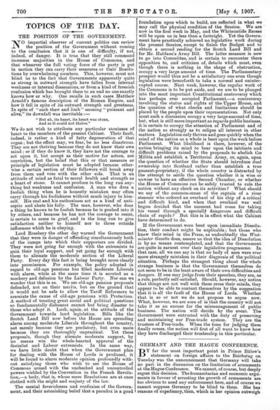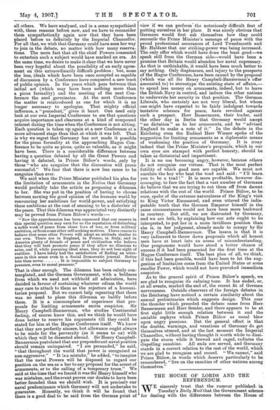GERMANY AND THE HAGUE CONFERENCE,
BY far the most important point in Prince Billow's statement on foreign affairs to the Reichstag on Tuesday was the announcement that Germany will take no part in the discussion on the limitation of armaments at the Hague Conference. We cannot, of course, but deeply regret this decision. The humanitarian and economic argu- ments in favour of arresting the growth of armaments are too obvious to need any enforcement here, and of course we cannot suppose Germany to be blind to them. She has reasons of expediency, then, which in her opinion outweigh all others. We have analysed, and in a sense sympathised with, these reasons before.now, and we have to reconsider theta sympathetically again now that they have been placed before us definitely by the Imperial Chancellor. Far all that, we wish that Germany could have seen her way to join in the debate, no matter with how many reserva- tions. The mere fact that all the chief Powers consented to entertain such a subject would have marked an era. At the same time, we desire to make it clear that we have never been very hopeful about the possibility of an early agree- ment on this extraordinarily difficult problem • but, none the less, ideals which have been once accepted as capable of discussion by a Conference have conquered a new tract of public opinion. In the years which pass between that initial act (which may have been nothing more than a pious formality) and the meeting of the next Con- ference the seed germinates. At the next Conference the matter is reintroduced as one for which it is no longer necessary to apologise. That mighty official influence, a " precedent," gives it heart. One need only look at our own Imperial Conference to see that questions acquire importance and clearness at a kind of compound interest during the time when the Conference is not sitting. Each question is taken up again at a new Conference at a more advanced stage than that at which it was left. That is wby we regret that Germany has not made it possible for the pious formality at the approaching Hague Con- ference to be quite so pious, quite so valuable, as it might have been. There is a considerable difference between having a question debated by all the Great Powers and having it debated, in Prince Billow's words, only by those "who are sanguine that the discussion will prove successful." We fear that there is now less cause to be
sanguine than ever
We said when the Prime Minister published his plea for the limitation of armaments in the Nation that Germany would probably take the article as proposing a dilemma to her. She was put in the position of having to choose between earning the good opinion of the humane world by renouncing her ambitions for world-power, and satisfying these ambitions at the cost of seeming to be a disturber of the peace. That this dilemma was appreciated very distinctly may be proved from Prince Billow's words :— " Now the apprehension has been expressed that our reserve in this special question may earn for us the reputation of disturbing a noble work of peace from sheer love of war, or from military ambition, or from some other self-seeking motives. I have reason to believe that some other Powers will adopt an attitude similar to our own. There are in England, in France, in Italy, and in America plenty of friends of peace and civilisation who believe that they will best promote peace if they allow no illusions to arise, and if, while pursuing ideal aims, they do not lose sight of realities. 1 have lately had the satisfaction of finding an utter- ance in this sense even in a Social Democratic journal. Better
late than never It is impossible to subject Germany to pressure, even to moral pressure.'
That is clear enough. The dilemma has been calmly con- templated, and the German Government, with a boldness from which we need not withhold all admiration, have decided in favour of sustaining whatever odium the world may care to attach to them as the rejectors of a humani- tarian proposal. But we cannot help repeating that there was no need to place this dilemnia, so baldly before them. It is a commonplace of experience that pro- posals for limiting armaments excite suspicion. Sir Henry Campbell-Bannerman, who studies Continental feeling, of course knew this, and we think he would have done better to reserve his arguments till they could be stated for him at the Hague Conference itself. We know that they are perfectly sincere, but allowance ought always to be made for the perversity (as it seems to us) with which they will be dissected abroad. Sir Henry Campbell- Bannerman postulated that our preponderant naval position should remain unimpaired. "I am persuaded," he said, "that throughout the world that power is recognised as non-aggressive." " It is a mistake," he added, " to imagine that the naval Powers will be disposed to regard our position on the sea as a bar to any proposal for the arrest of armaments, or to the calling of a temporary truce." We said at the time that we feared it was Sir Henry himself who was mistaken, and the event proves our doubts to have been better founded than we should .wish. It is precisely our naval predominance which Germany will not undertake to guarantee. Honestly, we think it will be found that there is a good deal to be said from the German point of view if we can perform the notoriously difficult feat of putting ourselves in her place. It was surely obvious that Germans would first ask themselves how they could reconcile the Prime Minister's message of peace with the proud professional assurances of Lord Tweedmouth and Mr. Haldane that our striking-power was being increased. The only offer which would have done the least good—we speak still from the German side—would have been a promise that Britain would abandon her naval supremacy. As that is unthinkable, it would have been much better to say nothing. Only displeasure, and injury to the prospects of the Hague Conference, have been caused by the proposal (which was all Sir Henry Campbell-Bannerman 's offer amounted to) to stereotype the existing state of affairs,— to spend less money on armaments, indeed, but to leave the British Navy in control, and induce the other nations to underwrite her security in that position. The German Liberals, who certainly are not very liberal, but whom one might have expected to be fairly indulgent towards tentative schemes for peace, have revolted against such a prospect. Herr Bassermann, their leader, said the other day in Berlin that Germany would accept " no dictation " as to her armaments, and he " advised England to make a note of it." In the debate in the Reichstag even the Radical Herr Wiener spoke of the suggestion for limiting armaments as a diplomatic means of weakening the position of Germany. It is irony indeed that the Prime Minister's proposals, which in our own eyes are stamped with perfect honesty, should be taken as dictatorial and impertinent.
It is no use becoming angry, however, because others do not recognise our virtues. That is the most perfect futility of which good men are capable. We must not emulate the boy who beat the toad and said : " I'll learn. you to be a toad !" It is more profitable, however -dis- couraging, to face the fact that a vast number of Germans do believe that we are trying to cut them off from decent. relations with the rest of the world. Prince Billow, to be. sure, spoke of the extreme naturalness of the King's visit to King Victor Emmanuel, and even uttered the indis- putable truth that the German Emperor himself in the. same circumstances would not have been more backward in courtesy. But still, we are distrusted by Germany, and we are loth, by explaining how our acts ought to be interpreted, to put her in a more invidious position. than, she is, in her judgment, already made to occupy by Sir Henry Campbell-Bannerman. The lesson is that it is very indiscreet to throw down proposals which all honest men have at heart into an arena of misunderstanding. Our programme would have stood a better chance of success if it had been presented for the first time at the Hague Conference itself. The best plan of all, we think, if this had been possible, would have been to let the sug- gestion of limitation come from the United States or some smaller Power, which would not have provoked immediate suspicion. As to the general spirit of Prince Billow's speech, we are glad to recognise its calming tone. It has ended, or, at all events, marked the end of, the recent fit of German nervousness. Outside observers of the foreign debates in, the Reichstag have noticed a certain similarity about the annual preliminaries which suggests design. This year the thunder which preceded the debate came from Herr. Bassermann and Herr Semler, and there appears to be at first sight little enough relation between it and the amiable zephyrs which Prince Billow as usual blew upon angry passions. But the general effect is that the doubts, warnings,, and vexations of Germany do, get themselves uttered, and at the last moment the Imperial, Chancellor, without having thought it worth while to dissi- pate the storm while it brewed and raged, radiates the dispelling sunshine. All ends are served, and Germany, stands in a correct relation to the rest of the world, which we are glad to recognise and record. " We cannot," said Prince Billow, in words which deserve iiarticularly to be remembered, "live on the enmities of other nations among themselves."















































 Previous page
Previous page